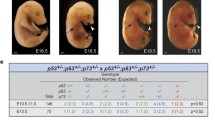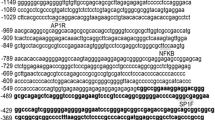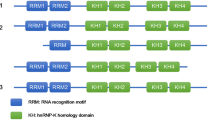Abstract
The p53 protein has been proposed as a modulator of the Wilms' tumour-suppressor protein (WT1) transcriptional regulation activity. To investigate this putative p53 role, the promoter P3 of the mouse insulin-like growth factor II gene (Igf2) was used as a target for WT1 regulation in primary cell cultures derived from p53 wild-type (p53+/+) and knock-out (p53-/-) mouse embryos. In these cells, the WT1 transcriptional activity was observed to be independent of p53 genotype. Furthermore, the two WT1 zinc finger (ZF) isoforms were for the first time found to have opposite effects on gene expression from a single promoter in the same cell type, WT1[-KTS] activating Igf2 P3, whereas WT1[+KTS] repressed its activity. In addition, we have mapped the WT1 binding sites and investigated the effect on WT1 binding activity of individual ZF deletions and Denys-Drash syndrome point mutations to this target.
Similar content being viewed by others
Author information
Authors and Affiliations
Rights and permissions
About this article
Cite this article
Duarte, A., Caricasole, A., Graham, C. et al. Wilms' tumour-suppressor protein isoforms have opposite effects on Igf2 expression in primary embryonic cells, independently of p53 genotype. Br J Cancer 77, 253–259 (1998). https://doi.org/10.1038/bjc.1998.41
Issue Date:
DOI: https://doi.org/10.1038/bjc.1998.41
- Springer Nature Limited




